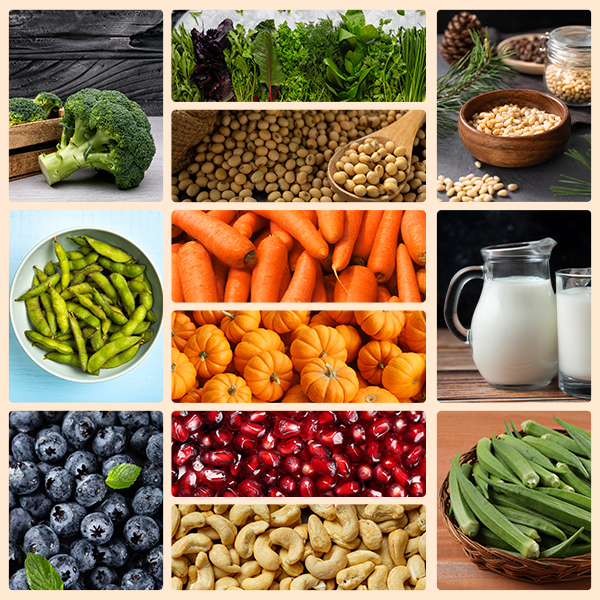Vitamin K: Why You Need this Vitamin as You Start Ageing
Blogs09 Jun 2025
IN THIS ARTICLE
If improving your health is a priority for you, then it’s always good to know more about the importance of essential nutrients and how much of them you should consume to boost your health. One such nutrient that you should know more about is Vitamin K. Known for its important role in blood clotting, Vitamin K is pivotal for many functions in the body and becomes increasingly necessary as we age. How does it help exactly? Let’s find out in this article!
Vitamin K Uses: Understanding Vitamin K & Its Function In The Body
Primarily found in green leafy vegetables, fermented foods and animal products, Vitamin K is a fat-soluble vitamin. It exists in two main forms, Vitamin K1(phylloquinone) and Vitamin K2 (menaquinone). Both of these forms are crucial for our body and give us different health benefits.
The main function of Vitamin K is that it acts as a coenzyme to help synthesise proteins involved in blood clotting. We all may think that blood clotting is always bad for our bodies, however, it’s a little-known fact that blood clotting when it occurs during an injury can help prevent excessive bleeding and heal wounds. Additionally, Vitamin K plays a vital role in bone metabolism by regulating calcium deposition in bones and preventing its accumulation in blood vessels, thereby supporting cardiovascular health.
Health Benefits of Vitamin K For Adults
Now let’s discuss some of the main health benefits from Vitamin K you can get:
1.Bone Health
One of the top benefits of Vitamin K is that it can improve bone health. Studies done on groups with osteoporosis, one of the leading causes of fractures worldwide, found that an increase in Vitamin K intake can cause a significant reduction in clinical fractures and increase bone strength. Since the incidence of bone issues like osteoporosis increases with age, Vitamin K becomes an important nutrient to consider.
2.Heart Health
Vitamin K also supports cardiovascular health by preventing the calcification of arteries. What does that mean? Calcified plaque is a waxy buildup in the artery walls that increases the risk of heart conditions and other issues. Some studies have found forms of Vitamin K to prevent this calcification and promote better heart health, although more research is required to establish this further.
3.Improves Insulin Sensitivity
In one study done on 355 patients, it was found that Vitamin K significantly improved insulin sensitivity in men with diabetes. Vitamin K gets involved with various aspects of diabetes including the creation of pancreatic cells, insulin sensitivity, increased glucose tolerance etc.
4.Blood clotting
Vitamin K can also be called the clotting vitamin as our bodies need Vitamin K to create a type of proteins which cause blood to clot. These proteins are known as clotting factors and without the presence of Vitamin K, our blood would not clot. This could be harmful in times of injuries and excessive bleeding.
How Much Vitamin K Do You Need?
The recommended dietary allowance (RDA) for Vitamin K varies by age and gender. In adults over 20, the average Vitamin K intake for men is 138 mcg and the average amount for women is 122 mcg. A balanced diet in which you prioritise green leafy vegetables, fermented foods, and animal products can help you easily get your daily intake of vitamin K.
What are the Sources of Vitamin K?
A lot of the sources of Vitamin K are hiding in plain sight in your very own kitchen. Here are all the top Vitamin K sources that you should look to add to meet your daily requirements:

- Green Leafy Vegetables - Collard greens, turnip greens, spinach, kale, broccoli
- Soybeans (both roasted and oil)
- Carrots
- Edamame
- Pumpkin
- Pomegranate
- Okra
- Pine nuts
- Blueberries
- Cashews
- Milk
Conclusion
Taking on the path of health means knowing the important nutrients that we need for smooth functioning. Vitamin K is another nutrient that you should know about as it plays a role in blood clotting, and insulin resistance, and supports bone health and heart health. Ensuring an adequate intake of Vitamin K through a balanced diet, rich in green leafy vegetables, broccoli, iceberg lettuce, and other sources, can significantly contribute to a healthier and more vibrant life. So make changes immediately to boost your overall health with Vitamin K!
Embrace the journey with RightShift, your companion on the path to a healthier, more fulfilling life. Use our informational blogs to increase your knowledge of all things health, nutrition and ageing. And take the first step towards positive change by trying our free health score calculator to understand your current health status and our free meal plan creator to get a customised meal plan made for you. Try these out today and make the right shift now!
Other Popular Blogs
Vitamin D Increasing Levels | Vitamin B Benefits | Vitamin A Benefits | Common Dietary Deficiencies
FAQs
Bleeding and haemorrhage are two of the biggest symptoms of a Vitamin K deficiency, however, not only is a Vitamin K deficiency rare, but these symptoms also only occur in severe cases. You may also notice bruising, blood clotting, reduced bone strength and a higher risk of osteoporosis with a deficiency in Vitamin K.
Vitamin K is often found in supplements with Calcium, Vitamin D, and Magnesium, all of which may help in healthy bones.
Green leafy vegetables like spinach, broccoli, vegetable oils, fruits like blueberries, meat, eggs, soybean etc are the best dietary sources of Vitamin K.




